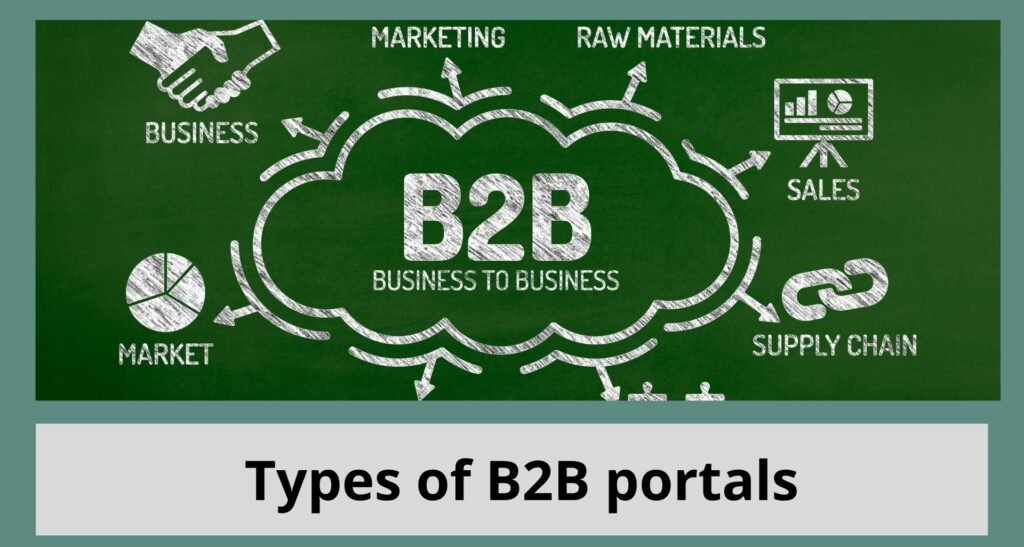In the digital age, businesses are constantly seeking innovative ways to streamline their operations and enhance their interactions with other businesses. One pivotal development in this quest has been the emergence of B2B portals.
These platforms have not only transformed the way businesses communicate but have also redefined the landscape of global commerce. Let’s delve into what B2B portals are and explore their significance in today’s business world.
What are B2B portals?
B2B portals, or business-to-business portals, are online platforms that facilitate transactions between businesses. Unlike traditional consumer-focused platforms, B2B portals are designed to meet the complex needs of companies engaging in commerce with other companies.
These platforms serve as a digital marketplace where businesses can buy, sell, and negotiate products and services on a global scale.

Types of B2B portals:
- Vertical Portals: Focus on specific industries, offering specialized products and services.
- Horizontal portals cater to a broad range of industries, providing a diverse array of products and services.

Real-World B2B Customer Portal Examples:
- Alibaba: A leading global B2B marketplace connecting suppliers with buyers across different industries.
- ThomasNet: specializes in the industrial sector, offering a platform for sourcing industrial products and services.
B2B portals are more than just digital marketplaces; they are comprehensive ecosystems that support the intricate web of business transactions across the globe. By offering a platform for businesses to connect, collaborate, and conduct commerce, B2B portals are driving efficiency, innovation, and growth in the business world.

Why Do You Need B2B Portals?
The necessity for B2B portals stems from the evolving landscape of global commerce. As businesses seek to expand their reach beyond local markets, these platforms provide an invaluable resource for connecting with partners and customers worldwide.
B2B portals offer a streamlined approach to business interactions, automating and simplifying processes that traditionally required significant time and resources.
This efficiency is crucial in today’s fast-paced world, where the ability to quickly respond to market demands can set a company apart from its competitors.
Moreover, B2B portals offer a level of operational efficiency that can significantly reduce overhead costs.
By facilitating online transactions, these platforms eliminate the need for physical stores and extensive print marketing materials, allowing businesses to allocate their resources more effectively.
Additionally, the insights gained from analytics and reporting tools available on B2B portals enable businesses to make data-driven decisions, further enhancing their strategic advantage.
The necessity for B2B portals stems from the evolving landscape of global commerce. As businesses seek to expand their reach beyond local markets, these platforms provide an invaluable resource for connecting with partners and customers worldwide.
B2B portals offer a streamlined approach to business interactions, automating and simplifying processes that traditionally required significant time and resources.
This efficiency is crucial in today’s fast-paced world, where the ability to quickly respond to market demands can set a company apart from its competitors.
Moreover, B2B portals offer a level of operational efficiency that can significantly reduce overhead costs.
By facilitating online transactions, these platforms eliminate the need for physical stores and extensive print marketing materials, allowing businesses to allocate their resources more effectively.
Additionally, the insights gained from analytics and reporting tools available on B2B portals enable businesses to make data-driven decisions, further enhancing their strategic advantage.

Benefits of B2B Portals
The advantages of B2B portals are numerous, impacting various aspects of business operations and strategy. Here are some of the most significant benefits:
- Streamlined Transactions: B2B portals make buying and selling between businesses more efficient, with automated processes for orders, payments, and fulfillment.
- Enhanced Customer Experience: By providing a seamless, user-friendly platform, B2B portals improve the customer experience, which can lead to increased loyalty and repeat business.
- Improved Collaboration: These platforms facilitate better communication and collaboration between businesses, suppliers, and customers.
- Increased Sales Opportunities: With a wider reach and improved efficiency, B2B portals can help businesses capture new sales opportunities and grow their customer base.
- Data-Driven Strategies: The analytics provided by B2B portals enable businesses to make informed decisions and tailor their strategies based on actual performance data.
- Reduced Costs: By automating processes and reducing the need for physical sales channels, B2B portals can help businesses save on operational costs.
- Scalability: As businesses grow, B2B portals can scale to accommodate increased traffic and transactions without the need for significant additional investment.

B2B Portals Are Vital for Certain Industries
In the intricate web of modern commerce, B2B (business-to-business) portals stand out as indispensable tools for various industries.
These digital platforms are not just beneficial; they are crucial for sectors that rely heavily on streamlined operations, efficient supply chains, and robust business relationships.

The Essential Role of B2B Portals
B2B portals serve as a digital bridge between businesses, facilitating a wide range of transactions and interactions.
For industries that deal with complex products, long sales cycles, and significant regulatory requirements, these portals offer a tailored solution that addresses specific challenges.
From manufacturing to healthcare, and from wholesale distribution to the technology sector, B2B portals provide a centralized platform for managing business operations, enhancing customer relationships, and driving growth.
Industries That Rely on B2B Portals
- Manufacturing:
In the manufacturing industry, efficiency and precision are paramount. B2B portals enable manufacturers to manage their supply chains effectively, streamline procurement processes, and maintain real-time communication with suppliers and distributors.
2. Healthcare:
The healthcare sector benefits immensely from B2B portals through the streamlined procurement of medical supplies, equipment, and pharmaceuticals.
These platforms ensure that healthcare providers have timely access to essential products, adhere to regulatory standards, and manage contracts and orders efficiently.
B2B portals in healthcare also support the secure exchange of sensitive information, complying with privacy regulations.
3. Technology:
For technology companies, B2B portals are vital for managing partnerships, distributing software, and providing support services. These platforms facilitate the licensing of software, the distribution of updates, and collaboration on development projects.
They also serve as a knowledge base, offering technical documentation, training materials, and support forums.
4. Wholesale and Distribution:
Wholesalers and distributors rely on B2B sales portals to connect with manufacturers and retailers efficiently.
These platforms support order management, inventory tracking, and dynamic pricing strategies. They also provide insights into customer behavior and market trends, helping businesses optimize their sales and distribution strategies.
5. Construction:
The construction industry benefits from B2B portals by streamlining the procurement of materials, managing subcontractor relationships, and tracking project progress.
These platforms facilitate the exchange of blueprints, specifications, and compliance documents, ensuring that projects are completed on time and within budget.

The Impact of B2B Portals
B2B portals offer numerous advantages to industries that adopt them. They enhance operational efficiency by automating routine tasks and providing real-time access to critical information.
This leads to improved decision-making, reduced costs, and increased productivity. Moreover, B2B portals strengthen business relationships by offering a seamless, user-friendly experience to partners, suppliers, and customers.
They support collaboration, foster transparency, and build trust among stakeholders.
Furthermore, B2B portals enable businesses to adapt to market changes quickly. They provide valuable insights into customer needs, market trends, and competitive dynamics.
This intelligence allows companies to innovate, tailor their offerings, and stay ahead in their respective industries.

Finding the Right B2B Portal Development Company
Selecting the right B2B portal development company is a critical decision that can significantly impact the success of your online business operations. B2B portals are specialized platforms that enable businesses to conduct transactions with other businesses efficiently. These platforms are essential for facilitating communication, managing transactions, and providing a centralized location for business interactions. Here’s a comprehensive guide to finding the right B2B portal development company for your needs.
Understanding Your Requirements
Before you begin your search for a B2B portal development company, it’s crucial to have a clear understanding of your business requirements. Consider the following:
- What are the specific goals you aim to achieve with your B2B portal?
- Who is your target audience, and what are their needs and preferences?
- What kind of products or services will you be offering through the portal?
- What are the key features and functionalities you need in the portal?
Having a detailed understanding of your requirements will help you communicate your vision effectively to potential development partners and ensure that the final product aligns with your business objectives.
Industry Experience and Expertise
When looking for a B2B portal development company, prioritize those with relevant industry experience and expertise. A company that has successfully developed B2B portals for businesses similar to yours will be more likely to understand your industry’s specific challenges and requirements. Review their portfolio and client testimonials to gauge their experience and the quality of their work.
Technology Competence
The technology stack used for your B2B portal is another critical factor to consider. Ensure that the development company has proficiency in the technologies required for your project. They should be well-versed in major programming languages, frameworks, databases, cloud platforms, and security protocols. Their competence in these areas will determine the robustness, scalability, and security of your B2B portal.
Security and Compliance
Given that B2B portals often handle sensitive data, it’s imperative to choose a development company that prioritizes security and understands compliance standards. Inquire about their approach to data protection, encryption, access controls, and security testing. Ensure that they are familiar with industry-specific regulations and can implement the necessary measures to keep your portal secure.
Integration Capabilities
Your B2B portal may need to integrate with existing systems such as ERPs, CRMs, or payment gateways. Assess the development company’s experience with integrating various systems and third-party APIs. Seamless integration capabilities are essential for ensuring that your portal functions smoothly within your existing business ecosystem.
Step-by-Step Development Process
A reputable B2B portal development company will follow a structured development process. This typically includes:
- Defining goals and objectives for the portal.
- Conducting market analysis to understand the competitive landscape.
- Designing a user-friendly interface that caters to your target audience.
- Developing the portal with the necessary features and functionalities.
- Implementing security measures and ensuring compliance with relevant standards.
- Testing the portal thoroughly to identify and fix any issues.
- Deploying the portal and providing ongoing support and maintenance.
Support and Maintenance
After the launch of your B2B portal, you will need ongoing support and maintenance to ensure that it remains up-to-date and secure. Establish a support plan with the development company that includes regular updates, bug fixes, and security patches. Additionally, ensure that they offer timely support to address any issues that users may encounter.

Introducing Logically Link: Your new b2b portal development company
Logically Link is a cutting-edge B2B client portal designed to streamline the way businesses interact and transact with each other. With a focus on creating a seamless, efficient, and user-friendly experience, Logically Link has revolutionized the B2B marketplace.
The platform offers a wide range of features and tools tailored to meet the specific needs of businesses, making it an indispensable resource for companies looking to gain a competitive edge in their respective industries.
One of the key strengths of Logically Link is its ability to facilitate connections between businesses. Whether it’s sourcing new suppliers, finding buyers for products, or exploring partnership opportunities, Logically Link provides a robust platform for businesses to expand their network and grow their operations.
The portal’s intuitive design and advanced search capabilities make it easy for users to find exactly what they’re looking for, saving time and resources in the process.

Benefits of Logically Link’s B2B Portal
The benefits of using Logically Link’s B2B portal are numerous, impacting various aspects of business operations. Here are some of the key advantages:
- Streamlined Transactions: Logically Link simplifies the buying and selling process, making it faster and more efficient. This is particularly beneficial for industries that deal with complex supply chains and procurement processes.
- Enhanced Communication: The platform offers various tools for communication, including messaging and forums, which facilitate clear and effective collaboration between businesses.
- Market Insights: Logically Link provides valuable data and analytics, giving businesses insights into market trends, customer behavior, and competitive analysis. This information is crucial for making informed decisions and strategizing effectively.
- Increased Visibility: By listing on Logically Link, businesses gain exposure to a wider audience, increasing their chances of finding new customers, suppliers, and partners.
- Customization and Integration: The portal offers customizable options to suit the specific needs of businesses, along with integration capabilities with existing systems like ERPs and CRMs. This ensures a seamless workflow and enhances operational efficiency.
Logically Link stands out for its commitment to security and compliance, ensuring that all transactions and data exchanges on the platform are protected. The portal’s robust security measures give businesses peace of mind, knowing their information is safe.
Conclusion:
In conclusion, Logically Link is not just another B2B portal; it’s a comprehensive solution that addresses the multifaceted needs of businesses in today’s digital age. With its user-friendly interface, advanced features, and a wide range of benefits, Logically Link is poised to remain a leader in the B2B marketplace, helping businesses achieve their goals and drive growth.
For further help or assistance, feel free to contact us or schedule a live demo.
FAQ’s:
What is a B2B customer portal?
A B2B customer portal is a private, secure, and personalized online platform where business clients can access services and perform various functions related to their account.
It’s designed to facilitate efficient self-service and streamline communication between a company and its business customers.
Through the portal, clients can place orders, track shipments, manage their account details, and access customer-specific data such as pricing and product availability
What is CRM for B2B?
CRM for B2B refers to customer relationship management systems tailored for businesses that sell to other businesses.
These systems help manage and analyze customer interactions and data throughout the customer lifecycle. The goal is to improve business relationships, retain customers, and drive sales growth.
B2B CRM systems often include features like sales automation, lead tracking, and detailed analytics to provide a comprehensive view of business interactions
What is a B2B web portal?
A B2B web portal is an online platform that enables business-to-business transactions and communication.
It’s a centralized place where businesses can engage in activities such as buying and selling goods and services, exchanging information, and collaborating on projects.
B2B web portals are designed to support the specific needs of businesses as they interact with other companies, offering features like bulk ordering, order management, and access to detailed product information
How do I connect with B2B clients?
Connecting with B2B clients involves leveraging various strategies and tools to establish and maintain professional relationships.
This can include attending industry events and trade shows, utilizing social media and professional networking sites, engaging in content marketing, and employing direct outreach through email or phone.
Building a strong online presence with a comprehensive B2B portal can also attract and retain clients by providing them with a convenient and efficient way to interact with your business
What is a B2B trade portal?
A B2B trade portal is a specialized online marketplace where businesses can buy and sell products and services to other businesses.
It acts as a platform for trade between companies, facilitating transactions and providing tools for communication, order management, and payment processing.
B2B trade portals are designed to accommodate the complex transactions typical in business-to-business dealings, such as bulk orders, custom pricing, and long-term contracts

